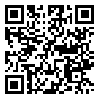

BibTeX | RIS | EndNote | Medlars | ProCite | Reference Manager | RefWorks
Send citation to:
URL: http://jdisabilstud.org/article-1-2774-en.html
2- Department of Psychiatry, School of Medicine, Ahvaz Jundishapur University of Medical Sciences
Background & Objectives: Obesity and body image dissatisfaction can cause severe personal, social, occupational, educational, and family problems. Obesity and overweight are proven risk factors for several acute and chronic diseases, such as coronary heart disease and type 2 diabetes. One of the most important and influential features in dissatisfaction with physical appearance is body image flexibility. This flexibility means the ability to accept and experience positive and negative thoughts, ideas, and feelings about the body simultaneously and is an essential protective factor for physical and psychological health and well–being. Another primary behavioral manifestation of body image anxiety and dissatisfaction is body image avoidance. Avoiding body image refers to any behavior that changes the mental experience of body image. Regarding the high rate of obesity and overweight among women, developing a comprehensive and effective program seems necessary for improving women’s nutritional behaviors and physical activity. So, the present study investigated the effectiveness of acceptance and commitment therapy (ACT) on body image avoidance and inflexibility in obese and overweight women.
Methods: This research method is quasi–experimental with a pretest–posttest design and a control group. The study’s statistical population included all the obese and overweight women with a body mass index (BMI) higher than 25, residents of Ahwaz City, Iran, who participated in this study from April 21 to June 21, 2021. Clinical interviews were conducted with all volunteers who met the inclusion criteria and were willing to participate in the study. The inclusion criteria were providing informed consent and willingness to participate in research, being 18 to 30 years old, having a body mass index (BMI) above 25, being dissatisfied with their body image, and holding a minimum of high school diploma education. The exclusion criteria were having a high risk of suicide measured by clinical interview, experiencing substance or drug abuse and dependency during the last 6 months, and suffering from other psychological disorders (like schizophrenia, depression, bipolar disorder, etc.). Thirty eligible volunteers were randomly selected and assigned to the two groups of ACT (n=15) and control (n=15). Body Image Avoidance Questionnaire (Rosen et al., 1999) and Body Image Psychological Inflexibility Scale (Callaghan et al., 2015) were administrated as pretest and posttest for two groups. The experiment group received 12 sessions of ACT, and the control group did not receive any intervention. Descriptive statistics (frequency, percentage, mean and standard deviation) and inferential statistics (multivariate and univariate analysis of covariance) were used to analyze the data. Data analysis was performed in SPSS software version 21, and the significance level of the tests was considered 0.05 or less.
Results: The results of the posttest showed that after eliminating the effect of pretest scores, there was a significant difference between experimental and control groups regarding the variable of body image avoidance, including clothing (p<0.001), eating restriction (p=0.004), social activities (p<0.001) and self–weighing (p=0.018) and the variable of body image psychological inflexibility (p<0.001). The mean scores of the mentioned variables in the experimental group decreased significantly.
Conclusion: Based on the study results, ACT is effective in improving body image avoidance and body image psychological inflexibility in overweight and obese women. Therefore, implementing comprehensive intervention programs with a psychological approach is necessary for these people.
| Rights and permissions | |
 |
This work is licensed under a Creative Commons Attribution-NonCommercial 4.0 International License. |



